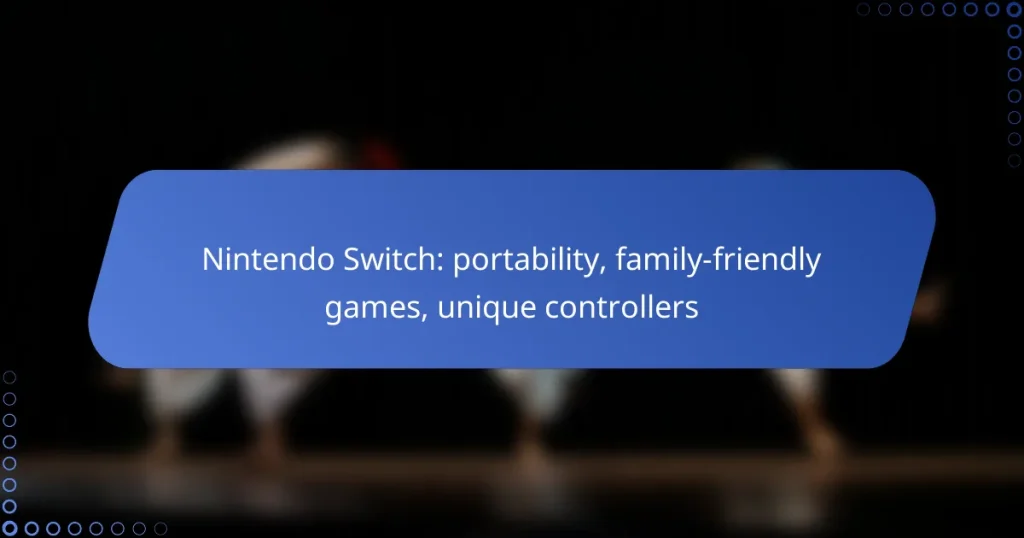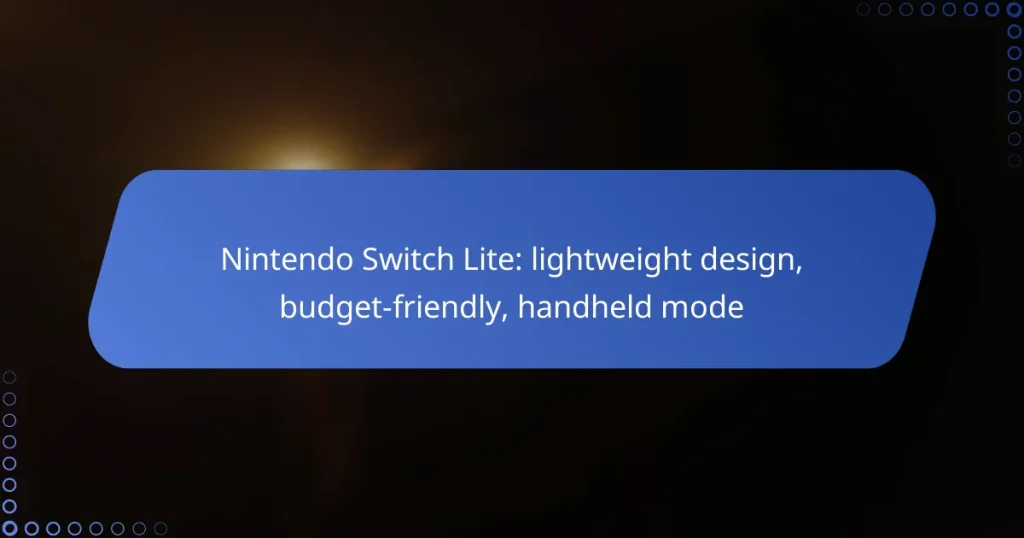Choosing the right gaming console can greatly enhance your gaming experience, whether you’re a casual player or a dedicated enthusiast. With various options available, it’s essential to consider factors like game library, online services, and hardware specifications to find the console that best suits your needs. By evaluating performance, price, and user feedback, you can make an informed decision that aligns with your gaming preferences and budget.
PlayStation 4 Pro: enhanced graphics, VR compatibility, multimedia features
Nintendo Switch: portability, family-friendly games, unique controllers
PlayStation 4 Slim: affordability, solid performance, extensive game library
Nintendo Switch OLED: vibrant display, improved audio, larger storage
PlayStation 5 Digital Edition: no disc drive, online game library, sleek design
PlayStation 3: classic titles, media playback, affordable options
Nintendo Switch Lite: lightweight design, budget-friendly, handheld mode
Xbox One S: 4K Blu-ray, family-friendly features, game sharing
Xbox 360: iconic games, online multiplayer, budget-friendly
Which gaming console is best for casual gamers?
The best gaming console for casual gamers is often the Nintendo Switch due to its versatility and ease of use. It caters to a wide range of gaming preferences, making it ideal for those who play occasionally or prefer family-friendly titles.
Nintendo Switch for portability
The Nintendo Switch stands out for its portability, allowing gamers to play at home or on the go. Its hybrid design means you can switch between handheld and docked modes seamlessly, making it perfect for casual gaming sessions.
With a library that includes popular titles like “Animal Crossing” and “Mario Kart,” the Switch appeals to a broad audience. Its user-friendly interface and motion controls make it accessible for players of all ages.
PlayStation 5 for exclusive titles
The PlayStation 5 is known for its exclusive titles that attract casual gamers looking for high-quality experiences. Games like “Ratchet & Clank: Rift Apart” and “Demon’s Souls” showcase the console’s capabilities and provide engaging gameplay.
While the PS5 may be less portable than the Switch, its powerful hardware delivers stunning graphics and fast load times. This makes it a great option for those who enjoy immersive single-player experiences.
Xbox Series X for performance
The Xbox Series X offers impressive performance, making it suitable for casual gamers who value graphics and speed. With features like Quick Resume and backward compatibility, it provides a smooth gaming experience across various titles.
Casual gamers can enjoy a vast library of games through Xbox Game Pass, which offers access to a rotating selection of titles for a monthly fee. This subscription model allows for flexible gaming without the commitment of purchasing individual games.
What factors should I consider when choosing a gaming console?
When choosing a gaming console, consider factors such as game library availability, online services, and hardware specifications. Each of these elements can significantly impact your gaming experience and satisfaction.
Game library availability
The game library is a crucial factor in selecting a gaming console. Different consoles offer exclusive titles and varying access to popular games. For example, PlayStation consoles often feature exclusive franchises like “God of War” and “The Last of Us,” while Xbox may have titles like “Halo” and “Gears of War.”
Check the current library of games for each console and consider what genres you enjoy. If you prefer multiplayer experiences, ensure the console has a strong selection of online games. Additionally, look for backward compatibility options, which allow you to play older games on newer systems.
Online services and subscriptions
Online services and subscriptions can enhance your gaming experience by providing access to multiplayer features, free games, and exclusive content. Services like PlayStation Plus and Xbox Game Pass offer different benefits, including cloud gaming and a rotating selection of games.
Evaluate the cost of these subscriptions and what they offer. For instance, Xbox Game Pass provides access to a large library of games for a monthly fee, making it a cost-effective choice for avid gamers. Be mindful of the terms and conditions, as some services may require annual commitments or have regional restrictions.
Hardware specifications
Hardware specifications, including processing power, graphics capabilities, and storage options, play a significant role in gaming performance. Higher specifications generally lead to better graphics and smoother gameplay. For example, the latest consoles may support 4K resolution and high frame rates, enhancing your visual experience.
Consider your gaming setup and preferences. If you have a 4K TV, a console that supports 4K output will be beneficial. Additionally, assess storage options; some consoles offer expandable storage solutions, which can be crucial for gamers with extensive libraries. Always check for the latest models to ensure you are getting the best technology available.
How do I compare gaming consoles?
To compare gaming consoles effectively, focus on key factors such as performance, price, and user feedback. Evaluating these aspects will help you determine which console best meets your gaming preferences and budget.
Performance benchmarks
Performance benchmarks assess how well a gaming console runs games, including frame rates, load times, and graphics quality. Look for consoles that offer high frame rates (ideally 60 FPS or more) and fast load times, often measured in seconds.
Consider the hardware specifications, such as CPU and GPU capabilities, as these directly influence performance. For instance, consoles with advanced graphics processing units can deliver more immersive gaming experiences with better visuals.
Price comparisons
Price is a crucial factor when choosing a gaming console. Prices can vary significantly, typically ranging from a few hundred to several hundred USD, depending on the model and features. Keep an eye out for seasonal sales or bundles that may offer better value.
Additionally, factor in the cost of games, accessories, and online subscriptions, as these can add to the overall expense. A console with a higher initial price might save you money in the long run if it has a larger library of affordable games.
User reviews and ratings
User reviews and ratings provide insight into real-world performance and satisfaction. Check reputable gaming websites and forums for feedback on specific consoles, focusing on aspects like reliability, ease of use, and customer support.
Look for trends in the reviews; if multiple users report similar issues or praises, it can help you make a more informed decision. Pay attention to ratings, with higher scores generally indicating better user satisfaction.
What are the best gaming consoles for families?
The best gaming consoles for families typically offer a mix of fun, accessibility, and a wide range of age-appropriate games. Consoles like the Nintendo Switch and Xbox Series S stand out for their family-friendly features and affordability.
Nintendo Switch for family-friendly games
The Nintendo Switch is renowned for its extensive library of family-friendly games, making it an ideal choice for households with children. Titles like “Mario Kart,” “Animal Crossing,” and “Super Mario Odyssey” cater to various age groups and interests.
Its unique hybrid design allows for both handheld and docked play, enabling families to enjoy gaming together on the big screen or on the go. The console supports multiplayer gaming, which encourages family interaction and shared experiences.
Xbox Series S for affordability
The Xbox Series S is a budget-friendly option that still delivers impressive performance for gaming. Its lower price point makes it accessible for families looking to enter the gaming world without a significant financial commitment.
Despite being less powerful than its counterpart, the Xbox Series X, the Series S offers a solid gaming experience with a growing library of games. Additionally, the Xbox Game Pass subscription service provides access to a wide variety of games, ensuring that families have plenty of options to choose from.
How do gaming consoles differ in online capabilities?
Gaming consoles vary significantly in their online capabilities, impacting multiplayer experiences, downloadable content, and subscription services. Key differences include the quality of online services, available features, and the overall user experience.
PlayStation Plus vs Xbox Game Pass
PlayStation Plus and Xbox Game Pass are two prominent subscription services that enhance online gaming. PlayStation Plus offers access to online multiplayer, free monthly games, and exclusive discounts, while Xbox Game Pass provides a library of games that can be downloaded and played at any time, along with online multiplayer access.
When choosing between them, consider your gaming preferences. If you prefer a broad selection of games to try, Xbox Game Pass may be more appealing. Conversely, if you enjoy playing online with friends and want regular free games, PlayStation Plus could be the better option.
Cross-platform play options
Cross-platform play allows gamers on different consoles to play together, enhancing multiplayer experiences. Not all games support this feature, so it’s essential to check if your favorite titles offer cross-play functionality.
Popular games like Fortnite and Call of Duty support cross-platform play, enabling friends to connect regardless of their console choice. When selecting a console, consider how important cross-platform capabilities are to your gaming experience, especially if you play with friends who own different systems.
What are the advantages of owning multiple gaming consoles?
Owning multiple gaming consoles allows players to enjoy a wider range of games and features, enhancing their overall gaming experience. Each console often has unique offerings that cater to different preferences, making it beneficial for avid gamers to diversify their collection.
Access to exclusive titles
Many gaming consoles have exclusive titles that are not available on other platforms. For example, PlayStation is known for franchises like “God of War” and “The Last of Us,” while Xbox features titles such as “Halo” and “Gears of War.” By owning multiple consoles, gamers can experience these unique games that define each platform.
Additionally, exclusive content may include downloadable content (DLC) or special editions that enhance gameplay. This can be a significant factor for gamers who want to access the full range of experiences offered by different consoles.
Diverse gaming experiences
Each gaming console offers distinct features, such as virtual reality capabilities, online services, and unique control schemes. For instance, the Nintendo Switch allows for portable gaming, while the Xbox Series X emphasizes high-performance graphics and fast load times. This variety enables players to choose the best console for their gaming style.
Moreover, different consoles often have varying online ecosystems and multiplayer options, which can affect how players interact with friends and the gaming community. By owning multiple consoles, gamers can switch between these ecosystems to find the best fit for their social gaming needs.
What are the emerging trends in gaming consoles?
Emerging trends in gaming consoles focus on enhanced connectivity, immersive experiences, and cloud-based solutions. These advancements are reshaping how players interact with games and each other, making gaming more accessible and engaging.
Cloud gaming integration
Cloud gaming integration allows players to stream games directly from servers, eliminating the need for powerful hardware. This trend is gaining traction as services like Google Stadia and NVIDIA GeForce Now enable gaming on various devices, including smartphones and low-end PCs.
When considering cloud gaming, look for a stable internet connection with low latency, ideally under 20 ms, to ensure a smooth experience. Subscriptions typically range from $10 to $30 per month, depending on the service and game library offered.
Virtual reality compatibility
Virtual reality compatibility is becoming a key feature in modern gaming consoles, providing immersive experiences that traditional gaming cannot match. Consoles like the PlayStation 5 support VR headsets, allowing players to step into their games and interact in new ways.
When choosing a console for VR, consider the availability of compatible games and the cost of VR equipment, which can range from a few hundred to over a thousand dollars. Ensure your play area is spacious enough for movement and that the console meets the technical requirements for VR gaming.








